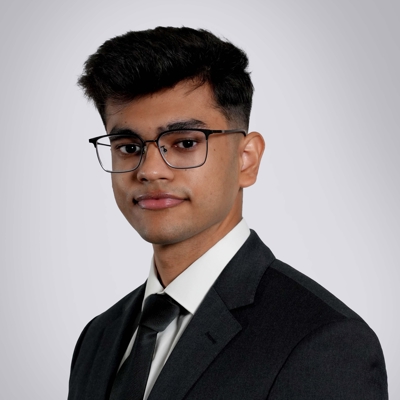My Intern Project
At MISO, interns apply their academic knowledge to real-world projects that impact the delivery of electricity to 45 million people. They are integral members of our team and gain invaluable workplace experience. Hear from our interns about the projects they supported during their summer at MISO.

Vi Raparthi, Purdue University, B.S. Data Science
Over the summer, I worked on the data and analytics team which helps the organization be better data practitioners. For example, if another team needs to model something they come to us and we assist them through that process.
My internship project focused on finding ways to make some of our models better. I was tasked with improving MISO’s risk assessment model. It's an important tool used to predict the next day’s level of risk when it comes to grid reliability. Throughout the internship, I had the opportunity to meet so many amazing people. I was able to talk to a lot of different business teams to learn and understand what they do so I could support them in my role.
Before this internship, I thought about doing a master's program right after school. What I learned this summer is I really like the industry and being able to apply what I've learned. So it's kind of changed my trajectory. I'm hoping to stay in the electric industry a little longer and then pursue higher education afterwards.
I think I grew a lot in my storytelling in the way that I present technical ideas and concepts to people who are outside of a data science skillset. Being able to tell that story of, “Hey, this is my idea, here's how it's going to help you and here's how it's going to help all of us.”

Ed Leveridge, University of Indianapolis, B.S. Computer Science
During my internship, I worked on a team that supports a lot of the MISO applications that everyone uses every day. I wrote a lot of Python scripts and completed a major project requiring automation. My team wanted to automate a lot of the processes that they have to do manually.
I loved the people and the culture at MISO. Everyone is personally invested in you getting better and learning everything that you can. I got to do a lot of cool things that I've never done before, and I've become a lot more confident in my skills and what I can accomplish. Being able to look at my resume and add a section to highlight my project is really nice.

Harnish Modi, Purdue University, B.S. Data Science
This summer, I focused on two projects: the FTR Path Price Dashboard and the Binding Constraints Tool.
For my first project, I developed a dashboard system to help MISO visualize and analyze historical FTR auction prices for wholesale electricity paths within the MISO footprint. This involved creating both the front-end and back-end of the system. For the front-end UI, I used Angular, a web framework that was entirely new to me. The back-end API was developed in Python, utilizing libraries such as Flask and Pandas. This tool significantly improved access to FTR path price data, making the process five times faster for all teams at MISO.
The second project involved porting legacy code into a widely used industry-standard language. The Binding Constraints Tool, used by the FTR team during their monthly and annual auctions, was originally coded in VBA Macros, which made it slow and outdated. I translated the logic into Python, enhancing the tool’s performance and speed. Additionally, I conducted further analysis on the data fetched by this tool and added several output attributes using formulas, providing better insights for the case executioners and making the tool ten times faster.

Zach Cox, Idaho State University, B.S. Finance
I'm a finance major, which is a pretty broad field. This summer I worked on a team that conducts both financial and governance related audits. The work was new to me and my team set things up in a way that I knew what I needed to do, and how to get there.
This internship definitely helped me figure out I like auditing. It was something really cool to learn because it was never really talked about in school. Especially at the depth I went into during my internship. That hands-on experience was extremely helpful for me.
One of the biggest takeaways for me is how to process things. Being on the audit team you have to look at things from a very abstract standpoint and make sure everything lines up. You have to be a critical thinker. I learned if you put some evidence inside an audit report, you may know what you're trying to say, but you have to make sure you break it down step by step and include all of the supporting documents.

Brooke Fuhrman, Texas A&M University, B.S. Technology Management
The internship was awesome. I worked on the strategic assessment team. Our role is to inform the organization about potential risks that MISO is facing and opportunities to change and address those risks. So we are future focused and we look at long-term objectives.
This internship has influenced what I want to do after graduation. My major has provided me foundational knowledge, yes. But interning at MISO allowed me to grow and learn and it opened my eyes to new opportunities for the future. The internship guided me in a way that I figured out I want to pursue a career that involves working in data science.
Over the course of the summer, I also gained valuable connections. Not only with my team members, but the other interns and employees across the organization. I was guided and mentored. Everybody wanted my success to happen. That was really what spoke to me - having everybody be on my side.

Seth Schuck, Indiana University, B.S. Public Affairs – HR Management
I worked with technical development team to create and facilitate training for our grid operators. I started from scratch with no experience and my team made sure I had all the tools I needed to learn everything and to be successful. They made me feel like a real employee.
The internship helped me realize that I really do have an interest in facilitation when it comes to training, whether that be on the organizational development side of things or on a very technical side, like I did this summer. I really like working in that facilitator role and helping people learn new things.